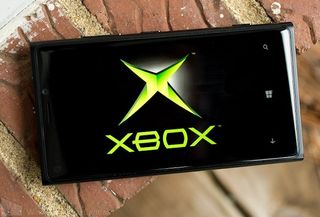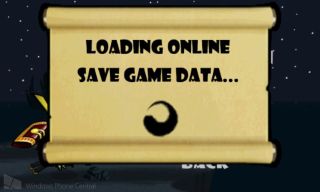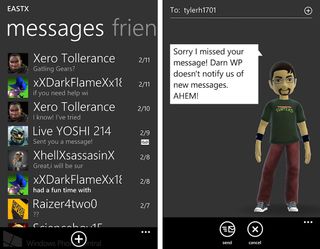How Microsoft can save Xbox games for Windows Phone: Part 5

Xbox for Windows Phone is a key selling point for gamers, but the implementation leaves much to be desired. This editorial series has covered a lot of ground so far, including the need for streamlining the Xbox Live certification process, Microsoft’s failure to appreciate the importance of Xbox to Windows Phone, the need for multiplatform game engine support, and the need for better PR and a download code system.
This week we tackle software and online features that Xbox Windows Phone badly needs.
Gamers must be able to back up and restore their save data.

Xbox 360 save data can be copied, retained, and restored. Why not Windows Phone too?
Remember how the inability to back up and redownload delisted games undermines users’ ownership of their games? Much like that, Windows Phone gives users absolutely no way to back up or restore their games’ save data. If you switch phones or even just delete a game for space, your save file will be completely inaccessible on the new device or after redownloading the game. It’s like that data never belonged to you.
The lack of save file exporting is problematic with all games, but especially Xbox Live ones. Some games are just really long – I’ve put 70 hours into Final Fantasy and still haven’t quite completed it. Other games require excessive grinding for their Achievements: Carcassonne, Angry Birds Space, and Flight Control Rocket are all fine games but immense time sinks for Achievement hunters. Some players just don’t want to make that time commitment when they can’t be assured of retaining their save files through thick and thin.
This can be easily fixed by creating a partition on the phone’s storage for game save data and then requiring all new games to store their saves in that partition. Deleting a game would not delete its data within the partition. Instead, users would be able to manually browse, delete, and copy this data at will - just as they can on the Xbox 360 and many other platforms. Being able to copy save data could potentially lead to the unscrupulous unlocking of Achievements, but tying the data to the owner’s Gamertag (as with Xbox 360) would prevent such cheating.
Update: My Samsung Focus died, causing me to lose that 70+ hour Final Fantasy save forever. How frustrating.
Get the Windows Central Newsletter
All the latest news, reviews, and guides for Windows and Xbox diehards.
Cloud saving should be mandatory in all Xbox games.

Skulls of the Shogun's cloud support is an exception rather than the rule.
You likely wouldn’t know it from looking at the Xbox Windows Phone game lineup, but the platform already has a good solution that allows users to access their data from any device: cloud saving. Storing a copy of the user’s local save data on the cloud and then restoring that copy when local data can’t be found easily solves the problem of save file volatility. A handful of games already use cloud saving: the Game Room titles, Full House Poker, Gun Bros (poorly), Wordament, AlphaJax, and Skulls of the Shogun. I might’ve missed a few, but that’s approximately nine games out of a lineup over 150 titles strong.
Cloud saving has actually been available to Windows Phone developers since 2011. The Build Conference in 2011 and 2012 had sessions called Title Managed Storage dedicated to teaching developers about Xbox Live’s cloud features. Every Xbox game, whether on Xbox 360, Windows Phone, PC, or even (argh) iOS has access to both a read-only storage area (good for quickly changing variables without going through a title update) and per-user area for saving players’ data.
Taking advantage of that per-user data is actually very little work for developers, so why don’t more Xbox Windows Phone games do just that? It can only be one of two things: developers either don’t know they have cloud access or they don’t realize that save data retention is a serious problem on Windows Phone. Either way, Microsoft can solve the problem by simply making cloud save support a requirement for developers instead of an option. Games already undergoing certification would need to be exempted, but over time a cloud save mandate would greatly benefit all mobile Xbox gamers.
Xbox games need global leaderboards.

I've got Windows Phone friends, but people who don't would see a blank Leaderboard in games like Zuma's Revenge.
A leaderboard is a score chart, much like you’d see between play sessions in an actual arcade game. The appeal of Xbox Live’s online leaderboards is that gamers can compare their performance against other players on a worldwide scale. Every decent online leaderboard also allows results to be filtered to show only scores belonging to the user’s friends.
When a player first buys a Windows Phone device, starts up an Xbox Live game, and looks at the in-game leaderboard, he or she is likely to see a completely blank leaderboard. That doesn’t mean nobody else plays that game. Instead, it reveals a huge problem with leaderboards in Xbox Windows Phone games: they’re friends-only.
When developing the Xbox Live APIs (application programming interfaces) for Windows Phone, Microsoft apparently plum forgot to create an API for global leaderboards. There is literally no way for game developers to provide an all-encompassing leaderboard within the Xbox Windows Phone system. Okay, there are actually a handful of exceptions: the Game Room titles, Full House Poker, Toy Soldiers: Boot Camp, and Wordament all have global leaderboards because they connect to special servers that are accessible from all platforms.
But other games don’t get that special server access, and so their leaderboards are restricted to users’ friends lists. If you don’t have any Windows Phone Xbox Live friends or none of those friends own a particular game, you won’t have anyone to compare your scores and progress with. A global leaderboard API would be easy to create (they already exist on Xbox 360 after all). Microsoft needs to prepare one and make it mandatory, just like it is with Xbox 360 games. Only then will Xbox-enabled leaderboards actually become useful to all Windows Phone gamers.
Xbox Live messaging lags inexplicably behind the Xbox 360.

Without a doubt, the Xbox 360 offers the most advanced peer-to-peer messaging system of any home console. Its cross-game voice chat has yet to be rivaled by Sony, though that could change with the Playstation 4. Advanced as the 360’s party chat and messaging systems are, Windows Phone sadly doesn’t compare.
Outside of a game, the Games hub and Xbox Live Extras app both allow users to send and receive text messages to other Xbox Live users, whether they own a console or a phone. That’s good, but Windows Phone inexplicably can’t record or even listen to voice messages – many 360 owners’ preferred form of messaging. Considering the abilities of a smartphone include voice recording and downloading audio files, there really is no excuse for voice messages not to be supported.
A few more outside-of-game quibbles: Windows Phone users should be able to toggle push notifications for incoming Xbox Live messages. Sending and receiving Xbox Live text messages should be almost as fast as SMS text messaging; the current interface is slow and cumbersome. A live tile that displays the number of unread messages (and subsequent integration with the notification center we all hope for) also makes perfect sense.
Xbox Windows Phone needs universal in-game chat and messaging.

AlphaJax allows players to chat with each other. Carcassonne does not.
Considering the scarcity of RAM in some Windows Phones as well as data usage concerns, it’s probably too much to ask for cross-game voice chat like the 360 enjoys. But that doesn’t mean players shouldn’t be able to communicate with friends from within a game.
Consider the handful of Windows Phone games with some form of online multiplayer: Battleship, Pool Pro Online, Carcassonne, Wordament (sort of), AlphaJax, and Skulls of the Shogun. Of those titles, only Pool Pro Online and AlphaJax have an in-game messaging system. If you want to communicate with another player while engaged in one of the other games, you’ll have to use Fast App Switching to enter the Games Hub, send the message, and resume your game. Even then, the recipient won’t be notified in-game that he or she has a message. A setup so cumbersome simply kills the social aspect of online gaming.
There are two ways to tackle this problem. Microsoft could simply require developers of games with online multiplayer to incorporate a chat interface of some sort. That should be obvious to any game maker, but it also takes some effort on their part. To ease things, Microsoft could at least provide universal chat and messaging APIs – whatever it takes to maintain a standard without scaring off developers.
Requiring in-game chat support is a good start, but it doesn’t solve the problem of communicating with someone who is playing a different game. So let’s take the in-game chat API idea a little further and create a cross-game messenger that users can access from within any Xbox Windows Phone title. Basically, this messenger would act like a slimmed-down version of the Guide button on an Xbox 360 controller. Just let users send messages and check their messages from within any Xbox game, and all of a sudden you hardly even need a game-specific chat interface.
Admittedly, Windows Phone lacks an Xbox-specific button. But Microsoft could either make a long press of the Home button activate the messenger or simply require developers to add it as an option to their games’ pause menus. Either way, Windows Phone would be much closer to replicating the console’s sublime Xbox Live social features.
Nearing the finish line...
All those online features and we still haven’t covered the need for better online play. Come back next week, habitually cool readers, when we’ll tackle that subject and more.
If you enjoyed this article, please comment on it and tweet it to everyone who would benefit from it. These problems won’t change until the right decision-makers realize their importance. Let’s do our best to make a difference together!
Paul Acevedo is the Games Editor at Windows Central. A lifelong gamer, he has written about videogames for over 15 years and reviewed over 350 games for our site. Follow him on Twitter @PaulRAcevedo. Don’t hate. Appreciate!

